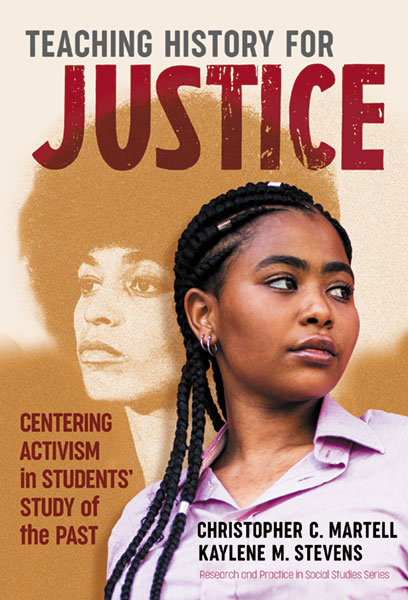Professors: Request an Exam Copy
Print copies available for US orders only. For orders outside the US, see our international distributors.
Christopher C. Martell, Kaylene M. Stevens
Publication Date: December 25, 2020
Pages: 176
Series: Research and Practice in Social Studies Series

Learn how to enact justice-oriented pedagogy and foster students’ critical engagement in today’s history classroom. Over the past 2 decades, various scholars have rightfully argued that we need to teach students to “think like a historian” or “think like a democratic citizen.” In this book, the authors advocate for cultivating activist thinking in the history classroom. Teachers can use Teaching History for Justice to show students how activism was used in the past to seek justice, how past social movements connect to the present, and how democratic tools can be used to change society. The first section examines the theoretical and research foundation for “thinking like an activist” and outlines three related pedagogical concepts: social inquiry, critical multiculturalism, and transformative democratic citizenship. The second section presents vignettes based on the authors’ studies of elementary, middle, and high school history teachers who engage in justice-oriented teaching practices.
Book Features:
Christopher C. Martell is an assistant professor of social studies education at the University of Massachusetts Boston. Kaylene M. Stevens is a lecturer of social studies education at Boston University. Both were formerly high school history teachers in the Framingham Public Schools, which is an urban district outside Boston, Massachusetts.
“Martell and Stevens provide an accessible review of pedagogical theory and research that supports teaching social justice issues in the history classroom. Teacher educators, curriculum designers, and preservice and in-service teachers will find this slim volume invaluable for better meeting the National Council for the Social Studies' College, Career, and Civic Life (C3) Framework for Social Studies State Standards.”
—CHOICE
“Martell and Stevens offer an original and compelling framework for teaching history for social justice in the United States. Drawing on theories and practices of social activism, the authors argue that a critical approach to history education informed by social activism can enable students to understand how past social movements have led to greater justice in the present, and how a critical activist orientation can empower students in the present to promote social justice today and in the future. By including multiple examples of history teachers in diverse settings and at different grade levels who have enacted activist-oriented approaches, the book is among the most important and relevant resources for teaching and learning history during politically contentious times.”
—Terrie Epstein, chair and professor of education, Hunter College, City University of New York
“In the wake of uprisings across the United States demanding racial justice,Teaching History for Justice is a timely contribution for social studies educators seeking to create classrooms focused on social change. Martell and Stevens not only make a compelling case for the need for justice in history education, but also provide educators with frameworks and pedagogical insights to cultivate students as activists. The approaches, strategies, and ideas found in this book give social studies educators a clear roadmap to leverage history education to create a more just and equitable future.”
—Alexander Cuenca, assistant professor, Indiana University
Contents (Tentative)
1. Centering Justice in Students’ Study of the Past 1
Why Do We Need to Teach History for Justice? 2
Where Does Teaching History for Justice Originate? 8
How Do We Teach History for Justice? 11
Conclusion 15
2. Thinking Like an Activist 16
Approaches to History Education 19
Types of Thinking in History 20
Using Activist Theories to Understand History 24
Thinking Like an Activist Classroom Tool 30
3. Social Inquiry 32
Making Inquiries Social 33
Inquiries Through a Historical Thinking Lens 34
Inquiries Through a Democratic Citizenship Lens 35
Inquiries Through a Justice Lens 35
4. Critical Multiculturalism 41
with Taylor Collins, Framingham Public Schools 41
Making the Curriculum Multicultural and Critical 43
Critical Multiculturalism in Action 50
5. Transformative Democratic Citizenship 56
Studying a Political, but Nonpartisan, History 59
Studying a Political History That is Democratic and Multicultural 62
Transformative Democratic Citizenship in Action 67
6. U.S. History at the High School Level: Ms. María Lopez 73
History for Justice in the U.S. History Classroom 74
Ms. María Lopez’s High School U.S. History Classroom 75
7. World History at the High School Level: Mr. Tom Kulig 90
with Maria R. Sequenzia, Framingham Public Schools 90
History for Justice in the World History Classroom 91
Mr. Tom Kulig’s High School World History Classroom 93
8. Ancient World History at the Middle Level: Ms. Joyce Smith 105
with Neema Avashia, Boston Public Schools 105
History for Justice in the Ancient History Classroom 107
Ms. Joyce Smith’s Middle School Ancient History Classroom 108
9. State and Local History at the Elementary Level: Mr. Frank Hashimoto 120
with Jennifer R. Bryson, Boston University 120
History for Justice in the State and Local History Classroom 122
Mr. Hashimoto’s Elementary School State and Local History Classroom 124
10. Overcoming Barriers 132
Overcoming the Barriers to History for Justice 133
Conclusion 140
References 141
About the Authors and Contributors 159
Index 161
Professors: Request an Exam Copy
Print copies available for US orders only. For orders outside the US, see our international distributors.